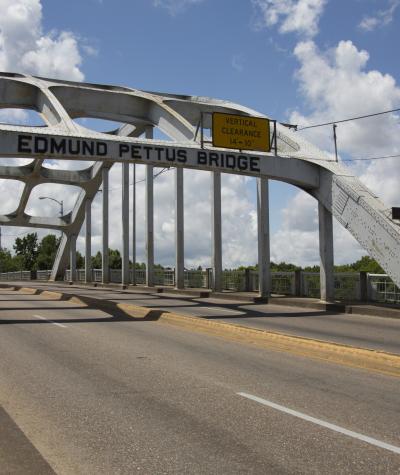DOJ Retreat on Voting Rights Sends the Wrong Message to Historically Marginalized Voters
Last week, the Department of Justice (DOJ) changed sides in a major Ohio voting rights case that is part of a national effort to place unnecessary burdens on citizens’ voting rights—burdens that disproportionately affect communities of color.
While it is not unprecedented for DOJ to reconsider litigation and policy positions when administrations change, the reversals we are witnessing lately are stark – and send a chilling message to communities that have had to fight hard for equal access to our democracy.
Most recently, DOJ reversed course and sided with the Ohio Secretary of State in his effort to purge from the voter rolls people who decline to vote in two election cycles and do not return registration confirmation notices within a designated amount of time. This move is part of a trend of states erecting hurdles aimed at reducing access to the ballot box. In an August 10 piece condemning DOJ for supporting this policy, the Washington Post Editorial Board wrote that Ohio is “one front in a nationwide campaign to suppress voting generally, the calculation being that most of those kicked off voting lists will belong to constituencies” that disproportionately include “minorities and younger voters.”
CLC will fight for Ohio voters, and will argue in an October Supreme Court brief that Ohio’s purge is unlawful under the National Voter Registration Act (NVRA).
The NVRA was enacted to facilitate voter registration and allow voters to maintain their eligible status, notwithstanding a change in address in certain circumstances. Ohio removed tens of thousands of voters from its rolls ahead of the November 2016 election. As the Post piece notes, the policy “rests on the bizarre presumption that a voter must have died or moved if he or she fails to cast a ballot.” It is telling that not a single career attorney in the department’s civil rights division signed onto the government’s legal brief.
With DOJ signaling that it supports a broad ability of states to purge voters from their registration lists, it send a message to voters in traditionally marginalized communities that they will not be protected under this administration. The only remedies are litigation and public education.
In another high-stakes voting rights case, DOJ sent a chilling message to minority voters by switching sides in the case challenging the legality of Texas’s strictest-in-the-nation voter photo ID law. After DOJ successfully sued Texas to block the law in 2013, a federal appeals court ruled in April that the law was enacted for a discriminatory purpose.
It was ruled discriminatory because the law was designed to impose a significant burden on minority voters’ ability to cast a ballot. The state crafted a list of acceptable forms of photo identification that excluded forms of ID minorities were most likely to hold.
If DOJ continues to show favor for laws that restrict voting, civil rights litigators and advocates will have to bear the burden of fighting for justice. But unfortunately, DOJ’s policy reversals are not limited to the area of voting rights.
DOJ Continues its Silence on Private Prison Policy Reversal
During the 2016 election, one of America’s largest private prison companies, GEO Group (through its wholly-owned subsidiary Geo Corrections Holdings, Inc.) gave $225,000 to the pro-Trump super PAC Rebuilding America Now, apparently violating the ban on government contractors contributing to political committees. GEO is one of the nation’s largest for-profit prison companies. According to a GEO employee, the company holds “detainees and federal prisoners at 24 detention centers with a capacity of 23,000 beds nationwide.”
GEO’s contribution preceded a stark change in official policy. In one of his first acts in office, Attorney General Jeff Sessions issued a memo nullifying the previous administration’s plans to phase-out the use of private prisons—plans that were supported by significant and startling data about a private prison system fraught with safety and security problems. Attorney General Sessions’ memo cited no evidence in support of the policy reversal.
CLC filed a FOIA Request on Feb. 28 requesting information on how DOJ reached its conclusion that it was reversing official policy on private prisons, opting to reinstate citizen-funded private prison contracts. Among other things, that request sought all communications between DOJ and Rebuilding America Now. To date, DOJ has failed to produce a single document, blowing past the statutory deadline to do so.
To put pressure on DOJ and put an end to its unlawful delay, CLC filed a lawsuit demanding DOJ identify and produce responsive documents. Meanwhile, GEO is reaping the reward of its campaign contribution. In April, it was widely reported that GEO Group would soon benefit from a new $110 million deal, inking a lucrative contract to become the first federal builder of an immigration detention center in the new administration. Construction is planned for a facility in East Texas. Curiously, the Houston metro area already has three existing Immigration and Customs Enforcement (ICE) detention centers. The people housed in these facilities are disproportionately communities of color, who do not have the same political power as the companies writing seven-figure checks to presidential campaigns.
This episode raises the troubling appearance of pay-to-play politics.
The danger of allowing this appearance to take root is that it makes individual citizens fear that government contracts are for sale to the highest campaign contributor. When citizens cannot trust government to use its taxpayer-funded resources in the interest of the public, trust in institutions naturally erode.
CLC will continue to fight for transparency from the DOJ on what factors it weighed when reversing its policy and will continue to push back against laws that make voting more difficult. It has never been more important to stay vigilant and watchdog this government agency with the goal of protecting and strengthening our democracy.
